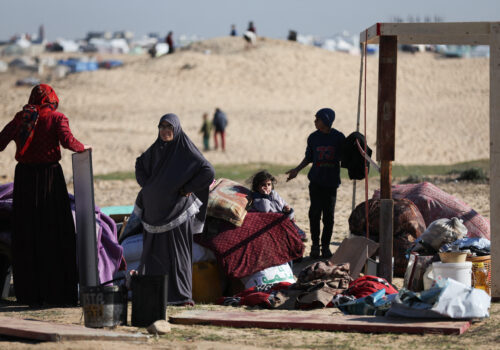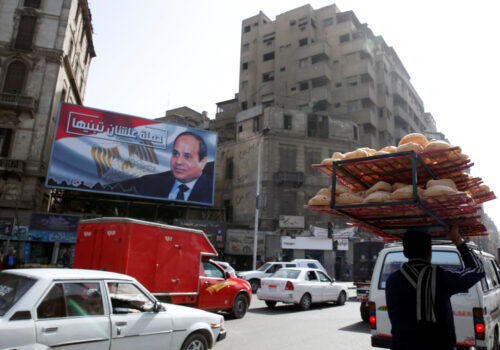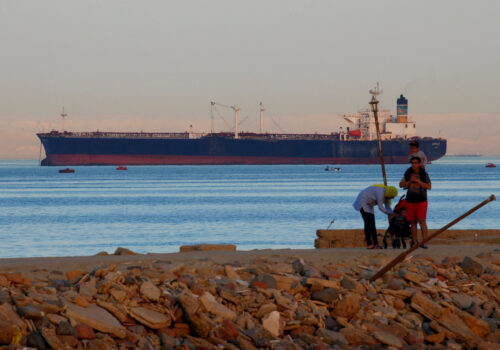Regardless of Sisi’s decision on Palestinian refugees in Rafah, he will not emerge as a winner
Egypt has beefed up security along its shared northern border with the Gaza Strip following Israeli Prime Minister Benjamin Netanyahu’s February 9 announcement of a planned ground offensive in Rafah, south of the enclave, “to eliminate Hamas’ last remaining strongholds.” The impending crisis has left Egyptian President Abdel Fattah el-Sisi with little options—as internal pressures continue to rise.
In preparation for the anticipated full-scale assault on Gaza’s southernmost city—where approximately 1.4 million displaced Palestinians have sought refuge in cramped tent encampments from Israel’s intense shelling of the Strip’s northern and central cities—Egypt has reportedly deployed forty tanks and armored personnel carriers to northeastern Sinai in recent days. The deployment is meant to bolster security in the border area, where a concrete wall topped with barbed wire was earlier erected—including an underground structure—to hinder the ability of Hamas to smuggle weapons into the Gaza Strip.
The recent security reinforcements are, meanwhile, meant to avert a possible mass influx of Palestinian refugees into northern Sinai; Cairo fears that Israel’s planned ground offensive of Rafah may prompt hundreds of thousands of desperate Palestinians—fleeing the violence—to storm the border and cross into Egyptian territory, never to return. The fears are not entirely unfounded: in the early days of the war, members of Netanyahu’s right-wing coalition had publicly called for the transfer of Palestinians to Egypt.
Since November 1, 2023, Egypt has allowed more than 2,200 wounded Palestinians to enter through the Rafah border crossing for medical treatment at hospitals in northern Sinai. An unknown number of Palestinians have also managed to cross into Egypt by directly negotiating a price—ranging between $6,000 and $13,000—with “brokers” to escape from the conflict.
Two elderly Gaza residents residing with relatives in Egypt, who asked that their names be withheld for fear of reprisals, told me they recently managed to flee the violence and make their way to safety through the Rafah crossing after paying the “exorbitant fees” requested by a local businessman “as a price for our safety.” I have heard similar accounts from other Palestinians. This option is reserved for a small number of affluent Gazans who have relatives outside the enclave and can afford to pay the high fee that guarantees their passage to safety.
Still, Egypt’s leadership is adamant about not allowing a mass influx of Palestinian refugees into Egypt—despite having taken in refugees from Syria, Sudan, and Yemen who had sought to escape the conflicts in their countries. Officials argue that the expulsion of Palestinians into Egypt would end the possibility of a Palestinian state and risks transforming Sinai into a base for militant attacks against Israel—with profound security implications for Egypt. Moreover, Egypt would likely need to deal with a humanitarian crisis in the Sinai Peninsula, piling added pressure on a country already in the throes of a dire economic situation.
Egyptian officials have reportedly warned that a mass displacement of Palestinians could cause Cairo to suspend the Camp David Accords signed in 1979, and would undermine security cooperation between the two countries, which has been strong since Abdel Fattah el-Sisi assumed power in 2013.
This warning, allegedly reiterated during talks between Sisi and US Secretary of State Antony Blinken in Cairo on February 7, is Egypt’s sternest yet to Israel and comes amid rising tensions between the two neighboring states over Netanyahu’s plan for Israel to seize control of the Philadelphi Corridor—a fourteen-kilometer ( 8.7 miles) route along the border separating the Sinai Peninsula from Gaza. Nevertheless, during a press conference in Slovenia on February 12, Egyptian Foreign Minister Sameh Shoukry denied reports that Cairo intended to freeze the peace treaty with Israel and insisted that Egypt would uphold its accord with Israel.
“A peace agreement between Egypt and Israel already exists and has been in effect for the last forty years,” Shoukry said. He added that the treaty will remain in place.
Netanyahu had unveiled the plan for Israel to overtake the buffer zone during a press conference on December 31, 2023 saying that the Philadelphi Corridor must be placed under Israel’s control to stop weapons from being smuggled through the southern border and ensure that Gaza is demilitarized after the war. Egypt and the Palestinian Authority have controlled the narrow buffer zone since 2003, following Israel’s disengagement from the Gaza Strip, which allowed Egypt to station border guards along its side of the frontier to patrol the area and prevent smuggling and infiltration into its territory.
After the overthrow of then-President Hosni Mubarak in February 2011, Egypt’s Supreme Council of the Armed Forces (SCAF)—the group that oversaw the transitional period leading up to Egypt’s first free and fair elections in 2012, which brought the Muslim Brotherhood to power—destroyed the vast majority of the underground tunnels leading into the Gaza Strip. Hamas had used the tunnels to smuggle commercial goods and weapons into the enclave.
After Sisi took power in 2013, he continued destroying the tunnels. Some Israeli officials, however, believe that additional tunnels still exist between Rafah and Sinai. Sisi also declared a state of emergency in North Sinai, effectively banning independent reporting from the region: several journalists who covered events here have been prosecuted and imprisoned. Security forces have since carried out a military campaign to rid the area of Islamic State of Iraq and el-Sham (ISIS)-affiliated insurgents who had sought to establish an Islamic state in the Sinai Peninsula. Egypt has since largely sealed its northern border, aiding Israel in enforcing a tight blockade around Gaza. The border crossing was only intermittently opened to allow Palestinians seeking medical treatment and students to enter Egypt.
Netanyahu’s recent remarks about seizing control of the buffer zone, effectively cutting Gaza off from Egypt, have irked the Egyptian authorities and the public alike—drawing harsh rebukes from government supporters and analysts.
SIGN UP FOR THE THIS WEEK IN THE MIDEAST NEWSLETTER
Diaa Rashwan, head of the State Information Service, rebuffed the plan as an attempt by Israel to cover up its failure to achieve its stated goals of eliminating Hamas in the Gaza war. Mustafa Bakri, a pro-government member of parliament, called the plan “an attack on Egypt’s sovereignty” and “a violation of the peace treaty” between the two countries. He urged Cairo to prevent the scheme at any cost—even if Egypt had to resort to military options. Mustapha Kamel el-Sayed, a professor at Cairo University, told me it shows a lack of respect on the part of Israel for the peace treaties it signed with neighboring Arab countries. He noted that the Philadelphi Corridor is a demilitarized zone under the Camp David Accords and should remain as such.
Tensions are also simmering in Cairo over US President Joe Biden’s remarks during a February 8 press conference that Egypt had initially been reluctant to open the border crossing to allow humanitarian aid into Gaza and that the US president had persuaded his Egyptian counterpart to open the border to allow the aid in. Cairo was quick to refute the allegations:
“Egypt opened the border from the start of the war, allowing the passage of humanitarian aid into the Gaza Strip without restrictions,” according to a statement released by the presidency on February 9. The Egyptian leadership pointed the finger at Israel, accusing it of disrupting the flow of aid by shelling the border crossing several times in the early days of the war. The statement called for a ceasefire to avert “a humanitarian disaster” and “protect civilians from further bombings, starvation, and disease.”
One thing is clear: The Egyptian leadership is stuck between a rock and a hard place. If it opens the border crossing to allow Palestinian refugees into Egypt, it risks being accused of complicity in the mass displacement of Palestinians. Many Egyptians believe that Palestinian refugees who enter Egypt will likely never be permitted to return to their homeland, which will be seized by Israel. On the other hand, if Sisi refuses to allow Palestinian refugees to cross into Egypt, he may be held accountable for the deaths of thousands more civilians, including women and children.
It’s worth noting that, according to a Wall Street Journal report published on February 15, Egypt has begun constructing an eight-square mile walled enclosure in the Sinai Desert near its border with the Gaza Strip to reportedly accommodate Palestinians should Israel’s imminent ground offensive prompt a mass exodus of refugees into the country. Egypt has denied any such contingency measures are taking place. However, the New York Times has also reported that satellite images have shown “a large patch of land being bulldozed and a wall being built in the buffer zone between Egypt and Rafah.”
Opposition activists have in recent days, taken to social media to express their skepticism over Sisi’s refusal to allow Palestinian refugees into Egypt. They claim that Cairo will eventually let the refugees in, which makes Egypt complicit and gives Israel the green light for the “ethnic cleansing” of Palestinians. Government supporters, on the other hand, laud Sisi for standing his ground and refusing to bow to the immense pressure from Israel and some Western governments to open the border to refugees fleeing the carnage.
Now that Israel has clarified its intent to undertake operations in Rafah, after evacuating the nearly 1.4 million displaced Palestinians who have sought a safe haven in the Gaza Strip’s southern city, it may only be a matter of time before Sisi’s true intentions are revealed. In either case, the Egyptian president will not emerge as a winner.
Shahira Amin is a nonresident senior fellow at the Atlantic Council’s Scowcroft Middle East Security Initiative and an independent journalist based in Cairo. A former contributor to CNN’s Inside Africa, Amin has been covering the development in post-revolution Egypt for several outlets, including Index on Censorship and Al-Monitor. Follow her on X: @sherryamin13.
Further reading
Wed, Jan 10, 2024
Egypt was mediating a deal to end the Gaza war. Then Saleh Al-Arouri was assassinated.
MENASource By Shahira Amin
Keen on regaining its traditional leadership role as chief mediator between Israel and the Palestinians, Cairo had put forward a three-stage plan to end the conflict.
Thu, Feb 15, 2024
Unraveling Egypt’s political economy puzzle: It’s more than just economics
MENASource By Racha Helwa
Egypt's economy continues to operate using piecemeal economic reforms, which are hindered by strong Nasser-era remnants, resulting in a slow and inconsistent pattern of implementation.
Thu, Feb 8, 2024
Houthi attacks on ships in the Red Sea add to Egypt’s economic troubles
MENASource By Shahira Amin
The decline in Suez Canal revenues has put further strain on Egypt's already faltering economy at a time when the country faces a severe foreign currency shortage.
Image: Palestinians shelter at the border with Egypt, amid fears of an exodus of Palestinians into Egypt, as the conflict between Israel and Hamas continues, in Rafah southern Gaza Strip February 16, 2024. REUTERS/Ibraheem Abu Mustafa


